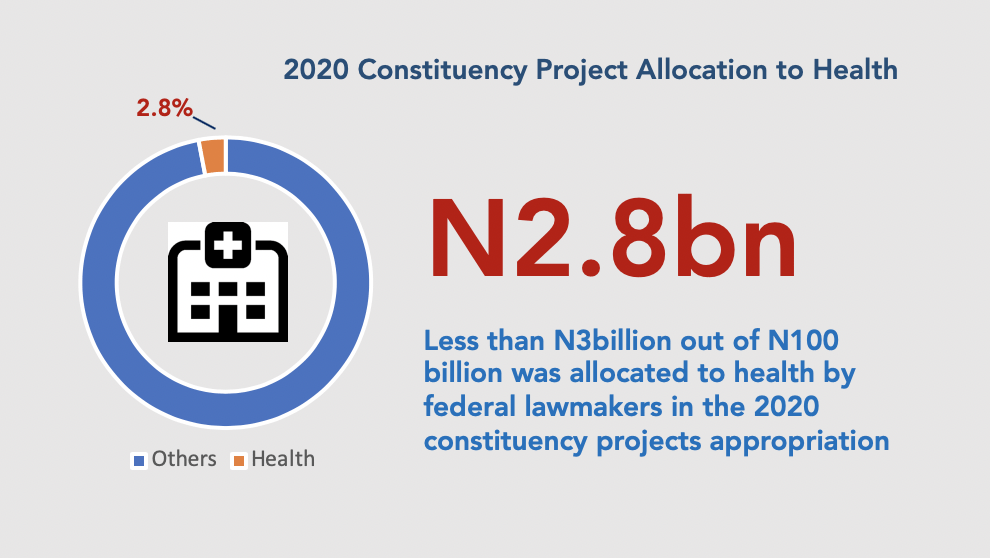The greatest fear that Nigerians have about the coronavirus pandemic is the inadequate healthcare infrastructure. For instance, it was reported recently that Nigeria has less than 500 ventilators for an estimated population of 206 million citizens.
Sadly, despite daily agitations of Nigerians about the collapse in the health sector, federal lawmakers allocated a meagre N2.8billion (N2,818,901,000) for health in the 2020 constituency projects appropriation. This amount is less than three percent of the total N100 billion appropriated for constituency projects in the 2020 budget, an analysis by DATAPHYTE has shown.
Though N2.44 billion was allocated to the Ministry of Health to implement 51 projects across the country, a further review of the entire document showed another 23 projects valued at N660 million in the budgets of other ministries. These give a total of 74 projects worth N3.097 billion.
However, of the N2.44 billion allocated to the Ministry of Health, our analyst found unrelated projects worth N279 million (N278,975,190) appropriated to the Ministry. Thus, the sum of projects with direct impact on healthcare totalled N2.8billion (N2,818,901,000).
Zonal intervention projects, commonly referred to as constituency projects are developmental projects sited in the geopolitical constituencies of lawmakers and implemented by various Ministries, Departments and Agencies (MDAs) of government. The zonal intervention project is capped at N100 billion annually by Nigerian lawmakers and it is shared among the 469 senators and members of the House of Representatives in the six geo-political zones. The House of Representative gets N60 billion while the Senate takes N40 billion to initiate and complete projects in their constituencies.
Despite the controversy that the scheme only gulps billions from the coffers of the government, the appropriation of less three percent for health-based projects is proof that Nigerian lawmakers do not prioritise key development infrastructures. For instance, while Health (2.4%), Education (4%) and Water Ministries (8%) got less than ten percent, the Office of the Secretary to the Government of the Federation (SGF) and the Ministries of Science and Technology, Trade and Investment and Labour get 15%, 14%, 12% and 8% of the allocation respectively.
Stakeholders have always lamented poor funding of the health sector. Last week, during the Dataphyte Webinar Series, Dr Ifeanyi Nsofor commented that Nigeria’s health sector is not prepared to combat the coronavirus crisis. He emphasized the need for governments to increase their health financing. Likewise, Dr Chiedo Nwankwo, a health and gender expert, at an event to discuss universal health coverage stressed that Nigeria had failed to properly fund the health sector.
Moreso, DATAPHYTE’s analysis of the Federal Government 2020 health budget decried that the federal government budgeted N2,000 in the year 2020 for the healthcare of each Nigerian. According to the report, only N427.3 billion was allocated for healthcare in the 2020 national budget.
The poor financing of healthcare in Nigeria has been made obvious even as lawmakers could only allocate three percent of the entire 2020 intervention budget to healthcare.
It is sad to note that with just 25 billion naira dedicated to cosntruction of primary health centres every year, Nigeria would have had twenty thousand (20,000) functional primary healthcare centres at the rate of N25 million in the last twenty years.
Reg Flag one: Health projects are hidden in other Ministries
A number of items in the 2020 ZIP have vague descriptions which make it difficult to track for accountability purposes. These are red flags for the bureau of public procurement and anti-corruption agencies to look out for in order to cut waste and ensure proper accountability in the implementation of these projects.
A line by line appraisal of budget items showed health projects that were nominated on health but assigned for implementation by non-health related agencies. 23 projects that are clearly health projects were assigned to other ministries.
For instance, the Office of the Secretary to the Government of the Federation (SGF) would implement 9 health projects worth 279 million, while the Humanitarian Ministry would implement one valued at N30 million. Also, the Ministry of Labour, SGDs Adviser Office and Ministry of Science and Technology would implement 10 health projects worth N80 million, N76 million and N50 million respectively.
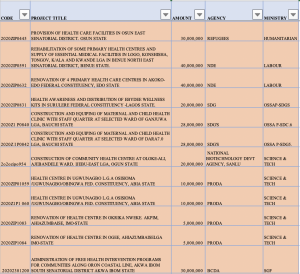
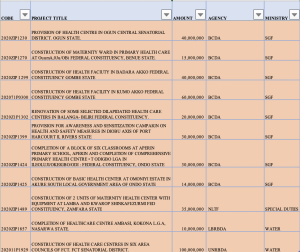
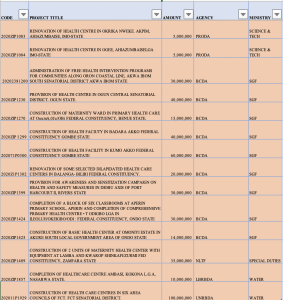
Also on the list are Ministries of Water Resources and Special Duties with the budget mandate to construct health centres worth N110 million and N35 million respectively. All these identified projects are tagged as red flags because the procurement, implementation and monitoring may be done poorly.
Red Flag Two: Health Ministry Implementing Unrelated Projects
Further findings revealed the Ministry of Health has ZIP allocation for projects not related to health. As listed below, at least five unrelated projects valued at about N279 million (N 278,975,190 ) will be implemented by the Ministry.
2020ZIP0390: N20 million for “Construction of a multi-purpose hall in Abia Central senatorial district, Abia state”. Moreover, the said project has no clear location, thus, making it difficult to track.
2020ZIP0401: N150 million for Training and Empowerment of Youths and Women in Abaji/Gwagwalada/Kuje and Kwali FCT”
2020ZIP0414: N50 million for “Supply of Mama Kits, drilling of motorized boreholes & procurement of computers in Kaduna central senatorial district, Kaduna state.” Though this has a health component, it is lumped with other unrelated projects
2020ZIP0424: N37 million (N36,975,190) for “Ecological Challenges and Erosion Control in Ijokodo Ibadan, Oyo State”
2020ZIP0425: N22 million for “Training and Empowerment in Cassava Processing for Women and Youth in Ibadan North Federal Constituency, Oyo State”
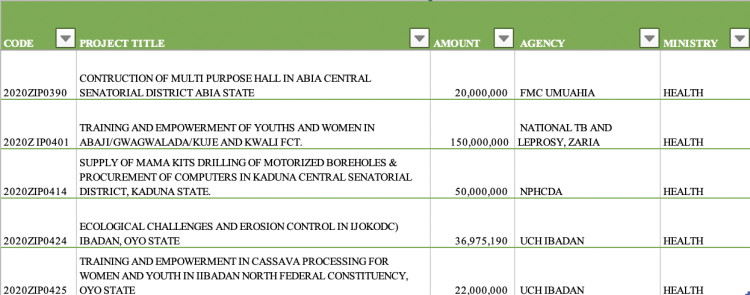
Constituency projects have been widely criticised as a drain pipe of lawmakers to perpetrate fraud in the budgeting process, and surreptitiously funnel public funds into the pockets of legislators in Nigeria. A report by PREMIUM TIMES in 2018 showed the scheme has gulped over N200 billion in three years in Nigeria.
While some advocates want the constituency project scheme eradicated, Ijeoma Okereke, the Project Officer of UDEME, a social accountability project of the PTCIJ, submitted that the constituency project scheme should be retained. She, however, calls for citizen participation in the planning and implementation of various projects being sponsored by their lawmakers. There is a “need for clearer description of projects by their exact location and for increased citizens feedback on the implementation of projects”, she said.

